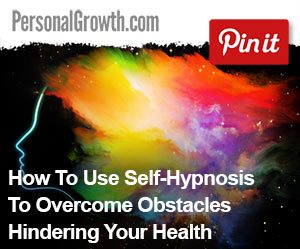

What if you could enjoy less stress, minimize aches and pains, lose those excess pounds and have better control of your overall health simply by imagining those states?
Well… the news is good; you can! Using hypnotherapy techniques can help you overcome some of the obstacles that may be hindering your health and wellness.
Contrary to popular belief, hypnosis is not about mind control; it is about mind focus and harnessing the imagination in order to effect positive changes.
What Is Hypnosis?
Hypnosis is the process of achieving a state of intense, focused concentration that allows the subconscious mind to operate in the forefront of the mind rather than as an underlying mechanism.
Essentially a hypnotic state is an extremely relaxed, focused state that allows a person to influence their sensations, thoughts and beliefs in a way that is not possible with the more rigid and inflexible conscious part of themselves.
During a hypnotic state, you are not out of control, merely less aware of your outer surroundings and more aware of your inner self, much as you would be if you were enjoying a good book or movie or engaging in a daydream.
What Are The Benefits Of Hypnosis?
Hypnosis can be used to manage a number of life’s challenges. It is particularly helpful in changing negative behaviors and in mediating the sensation of pain. Hypnosis can be used to:
How Does Hypnosis Work?
Hypnosis can be used both to prompt and/or suggest better, more healthful behaviors to your subconscious mind and to analyze the cause or origins of unwanted behaviors, thoughts or feelings.
To manage unwanted sensations, such as pain or nausea, hypnosis helps your mind keep its focus not on the pain or illness, but rather diverts it to other, more pleasant sensations.
Is Self-Hypnosis Effective?
Some practitioners argue that all hypnosis is self-hypnosis because achieving the relaxed state of mind that allows suggestion or analysis to be effective is dependent upon the individual, not the practitioner. So, if you are a willing participant, hypnotizing yourself is as likely to be as easy as seeing a professional.
However, self-hypnosis may be better for changing behaviors than for analyzing them.
You may want to elect to see a professional if you are experiencing significant mental health-related issues in order to explore more than one avenue of therapeutic treatment for optimal results.
Self-hypnosis can aid you in losing weight, quitting smoking, managing stress and a host of other everyday problems and health concerns.
What Is The Difference Between Hypnosis And Meditation?
While both hypnosis and meditation involve relaxing the body and the mind, hypnosis involves the additional step of changing a behavior, thought or sensation.
When you meditate, the goal is to achieve a state of relaxation that helps rejuvenate and revitalize your energy.
Hypnosis, however, is the process of prompting change to occur by harnessing the energy and creativity of the subconscious mind. The subconscious then influences the desires and goals of the conscious being so that these underlying thoughts and behaviors can become reality.
Techniques For Hypnotizing Yourself
There is no one way to induce self-hypnosis. The goal is to use whatever technique allows you relax, focus your energy, and make positive suggestions to yourself. Some people find it helpful to visualize a favorite restful place, some use tangible items like pictures or patterns, but you can use whatever method works best for you.
It may take some practice, but think about what kinds of situations you are in when you day dream and try to recreate those to get started. Remember to:
Once you are relaxed, suggest to yourself the behaviors or sensations that you want to change.

Combining both visual and verbal prompts will likely yield an optimal outcome, as they involve both hemispheres of the brain. Give yourself 15 to 20 minutes of suggestions and visualizations. You should feel relaxed and empowered when you are through.
Hypnosis takes practice and will likely require ongoing use in order to be effective. Keep working at it, and before you know it, you will have imagined your way to better health.

